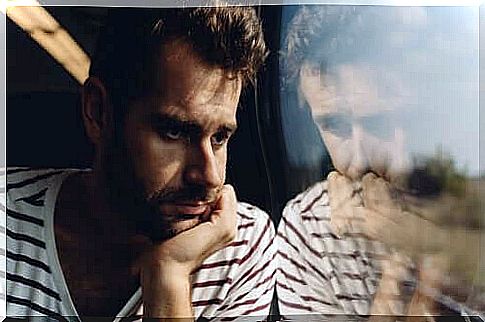Existential Vacuum: When Life Is Meaningless

Life is meaningless. It is the main belief among people who feel indifferent to life. People who feel the weight of injustice and a form of disconnection from everything around them. In other words, they are experiencing an existential vacuum.
They are usually reflective people who like to think about deep issues, such as death or lack of freedom, and they can not get rid of the existential vacuum that devours them from within. It is a vacuum that society contributes to by constantly sending signals about what is or is not valuable, and about assimilating immediate satisfaction.
But they also pursue constant enjoyment with the goal of alleviating their suffering. The problem is that they do not really pay attention to the emptiness they feel.
For some people, there is no good answer to the question, “Why is life worth living?” No one satisfies them, nothing satisfies them, and that is exactly what traps them in a psychological state of suffering. In most cases, this situation turns into a deep depression or self-destructive behavior.
An existential vacuum is a meaningful crisis, and it is the result of seeing oneself as someone who sees the world from a different perspective due to inconsistent thoughts, or as someone who is swept away by the constant pursuit of pleasure to avoid suffering.
This is a widespread phenomenon in today’s world, so let’s dive deeper into it.

Existential vacuum: in the depths of the abyss
The meaning of life that develops in your mind can be shattered when your goals do not turn out as you intended. When there is a big difference between expectation and reality, you can feel very disappointed.
When a critical situation threatens the feeling of security and certainty, you do not have the resources to deal with it, and it makes you frustrated. All this leads to existential frustration and sometimes to a painful abyss. It is as if you are carrying a desert within you where absurdity defines existence and all ability to connect with others is lost.
Psychologist Benjamin Wolman called this “existential neurosis”, and he defined it as:
The social aspect
Some writers, such as psychotherapist Tony Anatrella, point out that the loss of meaning stems from the constant pursuit of satisfying one’s ego, given that these are selfish actions that prevent you from achieving self-transcendence.
And when it comes to this, other authors argue that a sense that life is meaningless is associated with isolation, the superiority of individual values, and the mistaken belief that enjoyment is the key to happiness.
So you can focus on all your individual desires and thus dilute the feeling of social aspects, such as coexistence, solidarity or respect.
When you do not understand reality and your methods of becoming happy become goals, there is a risk of falling into an existential vacuum. Enjoyable, short-term feelings such as joy give rise to pleasure but not self-realization. As with other pleasures, they can be addictive or addictive.
In one way or another, you have to do something with your life that is not only good, but also made by you. Therefore, the meaning of life is linked to the destiny you desire and need. Because through this desire you can expect to develop freely.
When you feel happy, it is then that your freedom overcomes the limits of immanence, and you first realize that the meaning of life is not material or finite, but so much more.
But when things do not go as you expected, a lack of meaning in life can lead you to the abyss that is an existential vacuum.

The noetic dimension of man
According to the Austrian psychiatrist Victor Frankl, man has mainly three dimensions:
- Somatic dimension, which includes the body and the biological field.
- Psychic dimension, which includes the psychodynamic reality, or both the psychological and emotional universe.
- Noetic or spiritual dimension, which covers the phenomenology of the soul. Therefore, this dimension goes beyond the other two. Furthermore, it is thanks to it that people can develop a healthy life, psychologically speaking.
So when you feel a deep sense of apathy, it means that you are in conflict with your spiritual dimension. You may not be able to fix your wounds or even identify them; you feel unable to find a reason to live, so you drown in suffering and experience a lack of coherence and purpose. In other words, it is an existential vacuum.
Social and individual values
Frankl stressed that the way to find meaning lies in your values, and social awareness is what helps it come to the surface. But even if values come from personal intimacy, they can become universal values that match certain cultural, religious or philosophical systems.
Therefore, connecting with others, as well as maintaining affectionate bonds, is important so as not to lose the meaning of life, as long as you do not make others responsible for your own happiness. In a way, a meaningful life has its roots in social facts.
The French sociologist and philosopher Drukheim clearly describes the lack of social facts and what it means:

Explore yourself before trying to find the meaning of life
But it’s not about pointing accusing fingers or trying to find a savior. Instead, it is about having a reflective and responsible attitude that allows you to explore yourself. It is to find a purpose and get out of this existential vacuum.
It is also handy to realize that there are several ways to define the meaning of life: as many as there are people in the world. All of us can actually change the meaning of our lives during our journey through life. Therefore , what matters is not the meaning of life in general, but its meaning in a given moment, just as Viktor Frankl said.
Frankl also said that we should not explore the meaning of life, but instead explore ourselves. Responsibility is the intimate essence of your existence; find the meaning of life by finding yourself.
Change your attitude to get out of an existential vacuum
Even if you have invested time, energy, effort and heart, sometimes life is not fair. And even though it is perfectly natural to feel bad, you have two options: either you do not accept what has already happened and act as a victim, or you realize that the only thing you can change is your attitude towards it.
You are responsible for your own actions, feelings, thoughts and decisions. That is why you have the responsibility to decide what you feel responsible for. The meaning of life is thus in constant change. Every day and in every moment you have the opportunity to make a decision that determines whether you are stuck in a situation or acting with dignity, where you listen to yourself and free yourself from pleasure traps and instant gratification.









